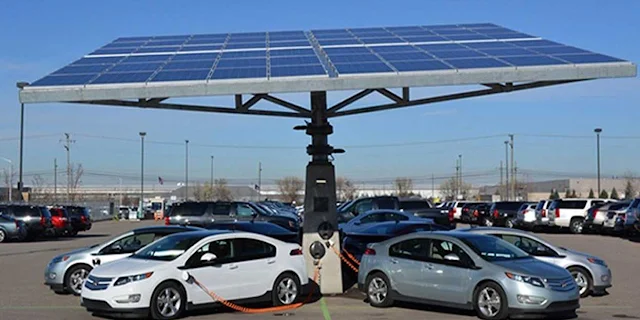- Get link
- Other Apps
A new study by Radboud University along with the Universities of Exeter and Cambridge, has concluded that electric cars cause lower carbon emissions, even if they are recharged from fossil fuel plants.
Source: chiledesarrollosustentable.cl
March, 2020.
The conclusion is clear: "To reduce carbon emissions, we should choose electric cars and domestic heat pumps instead of fossil fuel alternatives”.
In other words, the idea that electric vehicles or electric heat pumps could increase emissions is essentially a myth. We've heard a lot of discussion about this recently, with lack of information”, he acknowledges. Now there is a definitive study that can remove those myths. We have analyzed the numbers from all over the World, including a whole range of cars and heating systems.
“Even in the worst situation, there would be a reduction in emissions in almost all cases. This idea should be very useful for policy makers", says Knobloch.
The research analyzed current and future emissions from different types of vehicles and home heating options worldwide. It divided the world into 59 regions to take into account differences in power generation and technology.
In 53 of these regions, including Europe, the United States, and China, the results show that electric cars and heat pumps are less emission intensive than their fossil fuel alternatives.
These 53 regions represent 95% of global transport and heating demand and, with the decarbonization of energy production worldwide, Knobloch notes that "the last few debatable cases will soon disappear".
The researchers carried out a life cycle assessment in which they calculated not only greenhouse gas emissions generated by the use of cars and heating systems, but also in the production chain and waste processing.
Taking into account emissions from manufacturing and continued use of energy, it is clear that we should encourage the switch to electric cars and domestic heat pumps without any regrets", concludes Knobloch.
/br/>
_____________________
 |
| Image: odishanewsinsight.com |
Fears that electric cars could actually increase carbon emissions are unfounded in almost all parts of the world, according to this research published in the journal "Nature Sustainability", although various media reports have often questioned whether they are really eco-friendly considering the emissions from the production and generation of their electricity.
According to the investigation, driving an electric car is better for the environment than conventional gasoline-powered cars in 95% of the World. The only exceptions are places like Poland, where electricity generation is still mainly based on coal.
Average emissions from electric vehicles are up to 70% lower than those from gasoline cars in countries like Sweden and France (which get most of their electricity from renewable and nuclear sources), and about 30% less in the United Kingdom.
Within a few years, even inefficient electric cars will produce fewer emissions than most new gasoline vehicles in most countries, given that future electricity generation is expected to be less carbon-intensive than today.
The study shows that by 2050, every second car on the streets could be electric. This would reduce global CO2 emissions by up to 1.5 gigatons per year, equivalent to Russia's current total CO2 emissions.
The research also analyzed the domestic electric heat pumps and found that these also produce lower emissions than fossil fuel alternatives in 95% of the World. Heat pumps could reduce global CO2 emissions by 2050 by up to 0.8 gigatons per year, roughly the same to Germany's current annual emissions.
"We started this work a few years ago, and policy makers in the UK and abroad have demonstrated great interest in the results", explains Dr Florian Knobloch of the Department of Environmental Sciences at Radboud University (Netherlands) and author of the study.
The research also analyzed the domestic electric heat pumps and found that these also produce lower emissions than fossil fuel alternatives in 95% of the World. Heat pumps could reduce global CO2 emissions by 2050 by up to 0.8 gigatons per year, roughly the same to Germany's current annual emissions.
 |
| "To reduce carbon emissions, we should choose
electric cars and domestic heat pumps instead of fossil fuel alternatives”. |
The conclusion is clear: "To reduce carbon emissions, we should choose electric cars and domestic heat pumps instead of fossil fuel alternatives”.
In other words, the idea that electric vehicles or electric heat pumps could increase emissions is essentially a myth. We've heard a lot of discussion about this recently, with lack of information”, he acknowledges. Now there is a definitive study that can remove those myths. We have analyzed the numbers from all over the World, including a whole range of cars and heating systems.
“Even in the worst situation, there would be a reduction in emissions in almost all cases. This idea should be very useful for policy makers", says Knobloch.
The research analyzed current and future emissions from different types of vehicles and home heating options worldwide. It divided the world into 59 regions to take into account differences in power generation and technology.
In 53 of these regions, including Europe, the United States, and China, the results show that electric cars and heat pumps are less emission intensive than their fossil fuel alternatives.
These 53 regions represent 95% of global transport and heating demand and, with the decarbonization of energy production worldwide, Knobloch notes that "the last few debatable cases will soon disappear".
The researchers carried out a life cycle assessment in which they calculated not only greenhouse gas emissions generated by the use of cars and heating systems, but also in the production chain and waste processing.
Taking into account emissions from manufacturing and continued use of energy, it is clear that we should encourage the switch to electric cars and domestic heat pumps without any regrets", concludes Knobloch.
- Get link
- Other Apps
Comments
Post a Comment